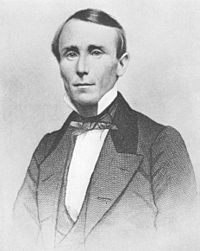It's difficult to realize today,
writes Vincent Canby, reviewing the 1987 movie "Walker" (starring Ed
Harris), that the real-life William Walker (1824-1860, image shown),
"who's now lucky to get a couple of paragraphs in an encyclopedia,
was, briefly, one of the most celebrated public personalities of his
time." [1]
Before the end of the American Civil War, Walker's memory enjoyed
great popularity in the southern and western United States, where he
was known as "General Walker" and as the "grey-eyed man of destiny."
Northerners, on the other hand, generally regarded him as a pirate.
Although forgotten now in the United States, in Central America even
today the name of "Walker" provokes shudders and thanksgiving for
deliverance from Walker. "In Central American countries, the
successful military campaign of 1856-1857 against William Walker
became a source of national pride and identity, and it was later
promoted by local historians and politicians as substitute for the war
of independence that Central America had not experienced. April 11 is
a Costa Rican national holiday in memory of Walker's defeat at
Rivas." [2]
The Knights of the Golden Circle (KGC) had, in vain, backed a
filibustering expedition against Cuba, during the Millard Fillmore
presidency. The idea was to provoke a casus belli (an excuse for war)
and force the United States to intervene militarily. (Background:
"'Free Trade' of Slaves and Opium",
http://www.shout.net/~bigred/mc061311.html)
Turning their eyes elsewhere than Cuba, the KGC espied Nicaragua.
The Knights resolved to try another filibustering expedition. For the
heading of this expedition they had, in their own ranks, one of the
most daring and courageous of "chivalrous" adventurers. "I allude to
the no less personage than General Walker. This gentleman was duly
furnished and equipped with ships, men, and money by the liberal
members of the K. G. C., and sent out to 'take Nicaragua.'" [3]
It was sincerely hoped that, by some ingenious maneuver, William
Walker would induce somebody to "insult" the United States, so that a
good excuse might be afforded for an aggressive war. "In this
expectation, however, they were greatly disappointed; for nobody did
insult the United States, nor even General Walker, half as much as
they were insulted. The only injustice done that individual was, that
he was not hung before he started on his first expedition." [3]
In the end, William Walker was executed by the government of Honduras
in 1860. News of his demise traveled slowly, but by December 19, 1860
the New York Times was able to report the death of Walker. The landing
of the Fillibusters at Truxillo had been "the signal of the most
enthusiastic demonstrations among the Nicaraguan Liberals. Parties of
them paraded the streets cheering the name of WALKER, and crying death
to the Government, and in some instances filing upon the guard-houses.
These exhibitions of sympathy the Government is said to have been
powerless to repress or punish; and when, after the news of the great
Fillibuster's execution had been received, attempts were made to
stimulate a general popular rejoicing over the event, they proved, so
far as Nicaragua was concerned, to be 'dead failures.'" [4]
But thanks to the New York Times reporting, we have the Last Words of
Walker. Led before a firing squad in Honduras on September 12, 1860,
Walker stared defiantly at his executioners and boldly exclaimed,
"Other Walkers shall arise from my blood!" [4]
And so it did happen. Movie reviewer Vincent Canby notices the odd
coincidence of the release of the film "Walker" in 1987, and the
televised Iran-contra hearings of that Summer, featuring Lieut. Col.
Oliver L. North. [1]
Izola Forrester, grand-daughter of KGC member John Wilkes Booth,
in her book, This One Mad Act, warned us that gradually, KGC grew
to the point where it was an international secret society. Many of the
goals of KGC were set for a future as far distant as 100 years.
(The post-Civil War activities of the Knights of the Golden Circle are
admirably sketched in the book, The Shadow of the Sentinel
also entitled "Rebel Gold"), by authors Warren Getler and Bob Brewer.
British fancy lads decreed that "Free Trade" is a "right." But their
"Free Trade" is a code word for slaves and opium. [5] Notice the
"Free Trade" of "slaves" (illegal immigrants) and "opium" (cocaine and
marijuana) from south of the U.S. border.
Are we now witnessing the gradual emergence of the "Golden Circle"
empire? The idea and name, Golden Circle, came from the proposal that,
with Havana as a center and a radius of sixteen geographical degrees
or about 1,200 miles, a great circle be drawn that would include
Maryland, Kentucky, southern Missouri, all the states south of them,
a portion of Kansas, most of Texas and Old Mexico, all of Central
America, the northern part of South America, and the entire West
Indies. This area they proposed to unite into a gigantic slave empire
that would rival in power and prestige the Roman Empire of two
thousand years ago. [6] Disturbingly, it was two fine southern
gentlemen -- Bill Clinton of Arkansas and Al Gore of Tennessee -
- who yet again pushed upon us the "Free Trade" in the 1990s.
------- Notes -------
[1] "Walker (1987)", movie review by Vincent Canby. New York Times,
Dec. 4, 1987
[2] "William Walker (filibuster)", Wikipedia, June 12, 2011
[3] Perrine, Charles O. An Authentic Exposition of the K.G.C.
[4] "Walkerism in Nicaragua", New York Times, December 19, 1860
[5] "'Free Trade' of Slaves and Opium",
http://www.shout.net/~bigred/mc061311.html
[6] Bridges, C.A., "The Knights of the Golden Circle: a Filibustering
Fantasy." Southwestern Historical Quarterly, Vol. XLIV, No. 3,
January, 1941.
Qtd. in Dell Leonardi. The Reincarnation of John Wilkes Booth (Devin-
Adair, 1975; ISBN: 0-8159-6716-0)
-------
via Melchizedek Communique
(Melchizedek Communique, MC061411)
http://www.shout.net/~bigred/cn.html

